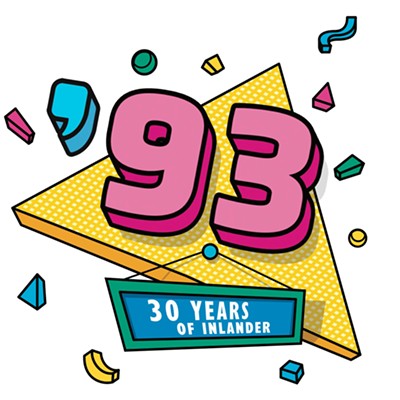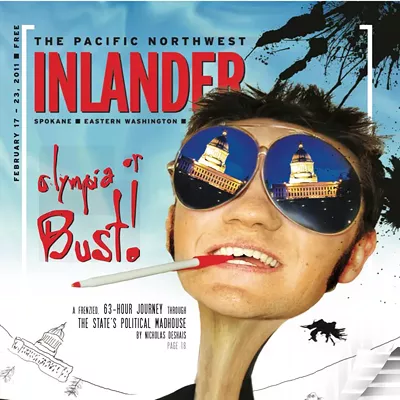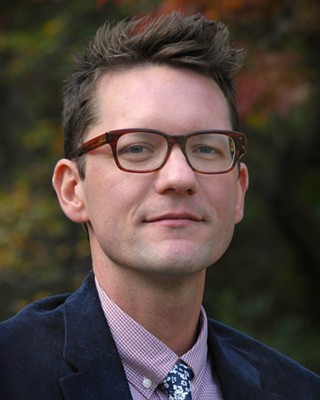Over the past year, Spokane City Councilman Al French has been the loudest voice fighting to keep advertising on hundreds of bus benches within city limits. He told us that it was the wrong time, given the economy and all, to rip out all the free benches. He told us that the law prohibiting ads on the benches was too broadly written and in need of an update, and held three town hall meetings to sound out his plan. He told us bus riders would be left standing in the cold if we took away the ads and the benches they came with. He told us banning the ads was a case of “having the right to do something rather than doing the right thing.”
But he never told us that he is a longtime friend and business associate of Thomas Hamilton, the man who owns Sunset Outdoor Advertising. At the time, Sunset was the city’s one and only bus bench advertiser, which raked in about $85,000 a year selling the ads, according to company manager Tom Townsend. Sunset operates 236 bus benches within city limits and another 100 or so in Cheney, Spokane Valley and other unincorporated parts of the county. Since 1997, the company has paid the city a total of $54,000 for the right to place advertising on the benches.
French and Hamilton — an architect and a developer, respectively — go way back, and their relationship has had some setbacks. Like the time in 2004 when they were working together on a 200-foot channel into the Spokane River behind Hamilton’s Post Falls house without any permits. Authorities found out, and after all was said and done, the episode cost Hamilton about $100,000 and left a smear on French’s reputation. But overall, things have been good. In fact, Hamilton donated some $6,800 worth of outdoor advertising in 2003 to one of French’s unsuccessful campaigns. And the two are currently working on the designs for an apartment complex in Airway Heights.
“Al’s a friend, yes,” says Hamilton. “Our relationship is primarily professional. He works for me. We don’t have a social relationship.” French did not return numerous messages seeking comment for this article.
Nevertheless, with a city ethics code that prohibits even the appearance of a conflict of interest, French’s actions, seemingly on behalf of his friend, tread a fine line.
French and Hamilton met 20 years ago, when French was the vice president of the Sabey Corporation, the company that developed and built the NorthTown Mall. Hamilton, who owned Pilgrim’s Nutrition Center, saw the potential the new mall possessed and relocated his business from across the street.
“I don’t think you can afford to be any place other than NorthTown,” Hamilton told a Chronicle reporter in April 1989, adding that the mall’s rent was three times what he was used to paying. Regardless of the price, it was the beginning of a fruitful relationship for the two men.
According to Hamilton, they’ve worked on numerous projects together over the years, including the dredging of a 200-foot channel into the Spokane River behind Hamilton’s $4 million, 7,200-square-foot home in Post Falls. It was Mother’s Day in 2004 and the men, along with the project’s contractor, Clearwater Summit Group of Hayden, removed some 400 cubic yards of dirt, creating an inlet to Hamilton’s house and muddying the water with a brown plume running far down the river. The work was mainly done on a Sunday, so officials weren’t notified until the next day. They came and stopped the work. Despite French’s declaring that he had filed permits for the work, officials from the U.S. Army Corps of Engineers, the Idaho Department of Lands and the Kootenai County Planning Department all said he did not obtain approvals to dig the inlet. In fact, Rand Wichman, who was the county’s planning director, said he had told French not to proceed with the project just two days before the digging occurred. “People can’t go out and just rape and pillage and expect to get away with it,” Wichman said at the time.
After months of wrangling, Hamilton agreed to fill in the channel but was later named, along with French and the contractor, in a court complaint filed by the state of Idaho.
Hamilton, who still says his dredging is better than erecting a “200-foot extended dock” into the river, says he ended up spending about $100,000 on the whole deal. If he had gotten the proper permits and hadn’t run into any trouble, he says the bill would have been about $15,000. Maybe $10,000.
All the dredging brouhaha left French steaming. He lashed out at the Spokesman, saying from the council’s dais that an article in the paper “was obviously designed to embarrass me … [and] impugns my reputation, not only as an architect, but as a member of this City Council.”
The episode was bump in their relationship, a friendship that had just yielded $6,800 of in-kind contributions from three of Hamilton’s businesses for French’s unsuccessful bid to become council president. Nonetheless, the two continued working together. Currently, they’re working on some “upper end” apartments in Airway Heights. The complex will have at least 20 units, and French and Hamilton are just waiting for a zone change to go through.
“My relationship with Al has been as an architect,” Hamilton says. “I have no idea if he had any involvement in sticking up for us [regarding bus benches]. If he was able to, I wish he would.”
In early May, the City Council amended a city law to allow for continued bus bench advertising. The 2001 law had been resurrected by Mayor Mary Verner mainly, she said, because the majority of the city’s bus benches were unlawful, ugly, in the wrong locations and dangerous. She didn’t want the law amended. She wanted it enforced.
Leading up to the vote, French had become the leading voice opposing Verner. It was stupid to get rid of free bus benches, he said, even if the benches were plastered with ads. Why subject bus riders — some elderly, some disabled — to standing when the benches were there already and free to the city, he asked. French held three public meetings in one week about the benches. As a board member of the Spokane Transit Authority, he spoke directly and eloquently about the need for bus benches, and most members of that board appeared to side with him.
By the night the council voted, he had also swayed his peers — only Councilman Richard Rush voted against the amendments. Directly before the vote, however, when the public had its chance to speak, French was confronted by a woman at the lectern.
“It is my understanding that [French] has been hired directly as a contractor by one of the clearest beneficiaries of the amendment, which would be Sunset Outdoor Advertising,” said Margaret Simonson.
Council President Joe Shogan cut her off after her first sentence to allow French to speak. “I have used bus benches once, in 2003, that was a contribution to a campaign that I ran then. That’s the only time in any race that I have ever had where I used bus benches. So, you know, this is a distraction from the real issue about how do we provide a service to the ridership of STA,” French said. “It’s disappointing that this is the direction that you chose to go in. But I am not a contractor to anybody affiliated with any of the… whether it’s Lamar, Emerald Advertising or anybody else. … Despite your attempts to try and smear my reputation or smear my name, it would be nice if you kept focused on the issue before us, which is about bus benches.”
Simonson mentioned the dredging and asked if French and Hamilton’s relationship would constitute a conflict of interest. Shogan looked to Mike Piccolo, legal counsel to the council, to explain what would merit a conflict of interest.
“Generally, a conflict of interest deals with any financial, pecuniary, beneficial interest to the council member,” Piccolo explained. “It usually doesn’t apply to items that are pure legislation that would apply citywide. In this case it appears that this amendment, sorry, this ordinance is a piece of legislation that would apply citywide to the general public.”
In other words, not a conflict of interest. Piccolo’s definition, however, doesn’t appear to come from the city’s code of ethics, which French pushed to install in the city code in the wake of Jim West’s disturbing fall. In the first section, “General Prohibition Against Conflicts of Interest,” the code says that if an action gives the appearance of a conflict, a City Council member should not do it. “[N]o current City officer … shall have an interest, financial or otherwise, direct or indirect, or engage in a business or transaction or professional activity, or incur an obligation of any nature, that might be seen as conflicting with the City officer[’s] … proper discharge of his official duties, the conduct of official City business or as adverse to the interests of the City.”
John Robideaux, a member of the city’s ethics committee, says the details of the case might constitute an investigation. “It does raise some concerns the way you describe it. But I’m sure Al would like to get his say in.”
Ron Large, also on the ethics committee and a professor in the religious studies department at Gonzaga, says the first step for such an investigation is the filing of a complaint, which can be lodged by any citizen.
“The ethics committee only deals with things that are brought before us,” Large says. “Unless we get a complaint, we don’t deal with things. It’s more reactive, you could say.”
Council President Shogan said he had heard of French’s potential conflict of interests regarding bus benches, mainly from Simonson at the council meeting, but that he was unwilling to make a judgment.
“The issue came out during the hearings, that’s all that I can say. … The issue is out there, so there’s nothing I can add,” he says. As for policing his own ethics, Shogan has a standard for himself. “If I have a question about the appearance, I reveal it,” and consult city attorneys about the legality of his actions.
Disclose potential conflicts of interest as early as possible — the same advice was given by the ethics committee in 2007, the first and, so far, only time it investigated French’s actions. He had made some changes to an ordinance that dealt with a property tax exemption program, and two Peaceful Valley residents filed a complaint, believing that a prior client of French’s architectural firm would benefit from the amendment. The ethics committee cleared French of wrongdoing.
The question of French’s ethics regarding bus benches is still alive, despite Sunset’s not making the final round of a process initiated by the mayor to revamp bus bench advertising. As early as this week, the city will choose between Creative Advertising and Ooh, both out-of-town companies.
“To have somebody from outside the area to come in and try to operate bus benches in this market, with the economics what they are … doesn’t make sense,” says Hamilton, bristling that his company, one of four that applied for the new bus bench contract, did not make the final cut.
For his part, French didn’t speak directly to any allegations of ethics violations against himself or his future as a public official, which is up in the air due to term limits forcing him off the council after eight years.
In the past, however, he has been outspoken about potential conflicts, like when then-Mayor Dennis Hession’s son was hired by American Medical Response, an ambulance company with an exclusive contract to operate within city limits.
“It doesn’t feel good, and it doesn’t smell good,” he said. “I haven’t had a chance to get any of the background on this thing to determine whether in fact it is an ethics violation or not, but I certainly think it does raise some questions about the timing and sequence.”























